40个英语介词用法总结
40个英语介词用法总结
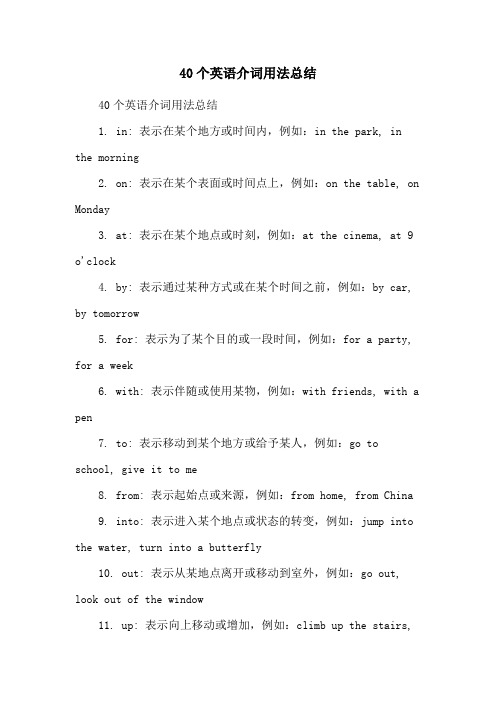
40个英语介词用法总结40个英语介词用法总结1. in: 表示在某个地方或时间内,例如:in the park, in the morning2. on: 表示在某个表面或时间点上,例如:on the table, on Monday3. at: 表示在某个地点或时刻,例如:at the cinema, at 9 o'clock4. by: 表示通过某种方式或在某个时间之前,例如:by car, by tomorrow5. for: 表示为了某个目的或一段时间,例如:for a party, for a week6. with: 表示伴随或使用某物,例如:with friends, with a pen7. to: 表示移动到某个地方或给予某人,例如:go to school, give it to me8. from: 表示起始点或来源,例如:from home, from China9. into: 表示进入某个地点或状态的转变,例如:jump into the water, turn into a butterfly10. out: 表示从某地点离开或移动到室外,例如:go out, look out of the window11. up: 表示向上移动或增加,例如:climb up the stairs,wake up12. down: 表示向下移动或减少,例如:walk down the hill, calm down13. about: 表示关于某事或在某个范围内,例如:talk about the movie, wander about the city14. off: 表示离开或关闭,例如:get off the bus, turnoff the lights15. on: 表示打开或激活,例如:turn on the TV, switch on the computer16. over: 表示越过或在某地上方,例如:jump over the fence, fly over the city17. under: 表示在某物下面或被控制或影响,例如:hide under the bed, live under his rules18. with: 表示具有某种特征或和某人一起做某事,例如:a man with blue eyes, dance with me19. without: 表示没有某物或在缺乏某物的情况下,例如:go without food, live without regret20. by: 表示通过某种方式,例如:learn by doing, go by bus21. through: 表示穿过某物或完成某事,例如:walk through the door, go through the documents22. across: 表示横穿某物或在某个范围内,例如:swimacross the river, all across the world23. between: 表示在两个事物之间或在某个时间段,例如:choose between two options, between 9 and 10 o'clock24. among: 表示在三个或三个以上事物之间或在某群人中,例如:share among friends, discuss among colleagues25. around: 表示在周围或在某个时间点附近,例如:walk around the park, around midnight26. through: 表示通过某事物或在某段时间内,例如:read through the book, work through the night27. against: 表示反对或靠在某物上,例如:fight against injustice, lean against the wall28. for: 表示代表或支持某人或某事,例如:vote for a candidate, fight for freedom29. towards: 表示朝向某个方向或对某人有好感,例如:walk towards the beach, feel towards someone30. within: 表示在某个时间或范围内,例如:arrive within an hour, within the city limits31. beyond: 表示超出某个界限或超过某个程度,例如:beyond expectations, beyond the horizon32. along: 表示沿着某个路线或伴随某人一起,例如:walk along the street, sing along with the song33. above: 表示在某物之上或高于某个程度,例如:flyabove the clouds, above average34. below: 表示在某物之下或低于某个程度,例如:swim below the surface, below freezing35. beside: 表示在某物旁边或和某人一起,例如:sit beside me, beside the lake36. near: 表示在某物附近或接近某个时间,例如:live near the beach, near the end37. past: 表示经过某个地点或在某个时间之后,例如:walk past the store, past midnight38. around: 表示在周围或大约某个数量,例如:look around the room, around 20 people39. after: 表示在某个时间之后或追求某人或某事,例如:after dinner, run after the dog40. before: 表示在某个时间之前或在某个事件之前,例如:before sunrise, before the meeting这些介词是英语中常用的一些基本介词,它们在表达地点、时间、方式等方面起到了重要的作用。
超全的英语介词用法归纳总结
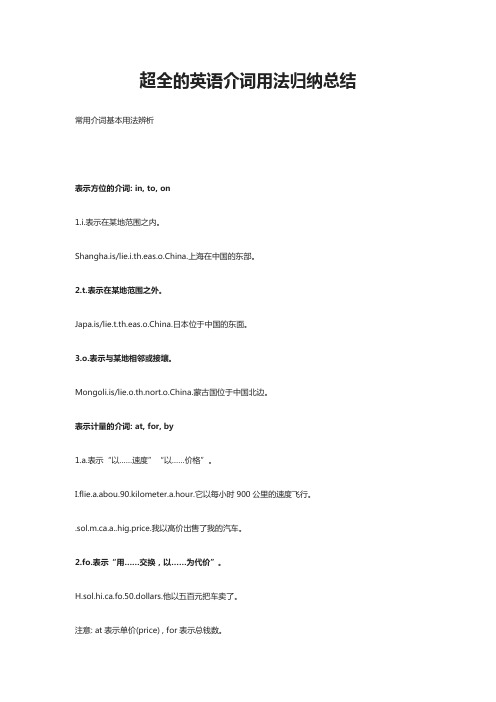
超全的英语介词用法归纳总结常用介词基本用法辨析表示方位的介词: in, to, on1.i.表示在某地范围之内。
Shangha.is/lie.i.th.eas.o.China.上海在中国的东部。
2.t.表示在某地范围之外。
Japa.is/lie.t.th.eas.o.China.日本位于中国的东面。
3.o.表示与某地相邻或接壤。
Mongoli.is/lie.o.th.nort.o.China.蒙古国位于中国北边。
表示计量的介词: at, for, by1.a.表示“以……速度”“以……价格”。
I.flie.a.abou.90.kilometer.a.hour.它以每小时900公里的速度飞行。
.sol.m.ca.a..hig.price.我以高价出售了我的汽车。
2.fo.表示“用……交换,以……为代价”。
H.sol.hi.ca.fo.50.dollars.他以五百元把车卖了。
注意: at表示单价(price) , for表示总钱数。
3.b.表示“以……计”, 后跟度量单位。
The.pai.hi.b.th.month.他们按月给他计酬。
Her.egg.ar.sol.b.weight.在这里鸡蛋是按重量卖的。
表示材料的介词: of, from, in1.o.成品仍可看出原料。
Thi.bo.i.mad.o.paper.这个盒子是纸做的。
2.fro.成品已看不出原料。
Win.i.mad.fro.grapes.葡萄酒是葡萄酿成的。
3.i.表示用某种材料或语言。
Pleas.fil.i.th.for.i.penci.first.请先用铅笔填写这个表格。
The.tal.i.English.他们用英语交谈。
表示工具或手段的介词: by, with, on1.b.用某种方式, 多用于交通。
.wen.ther.b.bus.我坐公共汽车去那儿。
2.with表示“用某种工具”。
H.brok.th.windo.wit..stone.他用石头把玻璃砸坏了。
史上超全的英语介词用法归纳总结!不看太可惜了
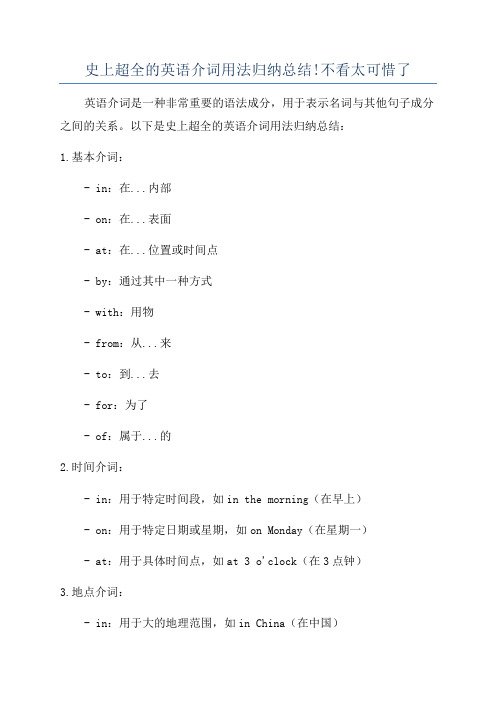
史上超全的英语介词用法归纳总结!不看太可惜了英语介词是一种非常重要的语法成分,用于表示名词与其他句子成分之间的关系。
以下是史上超全的英语介词用法归纳总结:1.基本介词:- in:在...内部- on:在...表面- at:在...位置或时间点- by:通过其中一种方式- with:用物- from:从...来- to:到...去- for:为了- of:属于...的2.时间介词:- in:用于特定时间段,如in the morning(在早上)- on:用于特定日期或星期,如on Monday(在星期一)- at:用于具体时间点,如at 3 o'clock(在3点钟)3.地点介词:- in:用于大的地理范围,如in China(在中国)- on:用于较小的地理范围或表面,如on the street(在街上)- at:用于具体地点,如at the supermarket(在超市)4.方向介词:- to:表示到达一些地方,如go to school(去学校)- into:表示进入一些地方,如go into the house(进入房子)- out of:表示离开一些地方,如get out of the car(离开车)5.原因介词:- because of:由于,如He is late because of the traffic(他因为交通堵塞而迟到)- due to:由于,如The flight was canceled due to bad weather(因为恶劣天气,航班被取消)6.动词短语介词:- look after:照顾,如She looks after her younger brother (她照顾她的弟弟)- take care of:照顾,如He takes care of his plants(他照顾他的植物)7.形容词短语介词:- interested in:对...感兴趣,如She is interested in music (她对音乐感兴趣)- good at:擅长...,如He is good at playing basketball(他擅长打篮球)8.其他常见介词用法:- with regard to:关于,如With regard to the matter, I have something to say(关于这件事,我有些话要说)- instead of:代替,如I will go instead of him(我将代替他去)- according to:根据,如According to the weather forecast, it will rain tomorrow(根据天气预报,明天会下雨)以上是一些常见的英语介词用法总结,希望能帮到你!。
40个介词用法总结

40个介词用法总结介词是英语中非常重要的一类词性,它在句子中起着连接词与词、短语与短语的作用。
介词的正确使用对于句子的表达和理解至关重要。
下面将介绍40个常见介词的用法总结,希望能够帮助大家更好地掌握介词的用法。
1. about。
介词about表示“关于”,用于询问或表达主题或内容。
例如,What are you talking about?(你在谈论什么?)。
2. above。
介词above表示“在……之上”,用于表示位置关系。
例如,The sun is above the clouds.(太阳在云层之上。
)。
3. across。
介词across表示“横过,穿过”,用于表示横跨某个区域或穿过某个物体。
例如,We walked across the bridge.(我们走过了桥。
)。
4. after。
介词after表示“在……之后”,用于表示时间先后关系。
例如,We'll go for a walk after dinner.(晚饭后我们会去散步。
)。
5. against。
介词against表示“靠着,依靠”,用于表示两个物体之间的接触或支撑关系。
例如,He leaned against the wall.(他靠在墙上。
)。
6. along。
介词along表示“沿着”,用于表示沿着某个方向或路线。
例如,We walked along the river.(我们沿着河边走。
)。
7. amid。
介词amid表示“在……之中”,用于表示某个场所或环境中。
例如,The children played happily amid the flowers.(孩子们在花丛中快乐地玩耍。
)。
8. among。
介词among表示“在……之中”,用于表示三个或三个以上的人或物之间的关系。
例如,She is among the top students in her class.(她是班里的尖子学生之一。
)。
9. around。
英语中常见介词用法总结
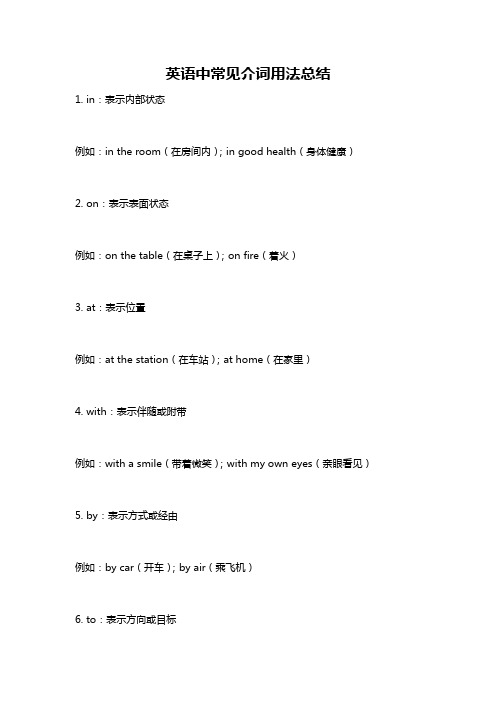
英语中常见介词用法总结
1. in:表示内部状态
例如:in the room(在房间内);in good health(身体健康)2. on:表示表面状态
例如:on the table(在桌子上);on fire(着火)
3. at:表示位置
例如:at the station(在车站);at home(在家里)
4. with:表示伴随或附带
例如:with a smile(带着微笑);with my own eyes(亲眼看见)5. by:表示方式或经由
例如:by car(开车);by air(乘飞机)
6. to:表示方向或目标
例如:to the park(去公园);to the moon(到月球)
7. from:表示出发地或来源
例如:from Beijing(来自北京);from the magazine(从杂志中)
8. for:表示目的或用途
例如:for a birthday party(为了生日派对);for writing(用于写作)
9. of:表示属于或关系
例如:the book of Harry Potter(哈利·波特的书);the sister of Mary(玛丽的姐姐)
10. with:表示具有或伴随
例如:a man with a gun(拿着枪的人);a girl with long hair(长发女孩)。
40个英语介词
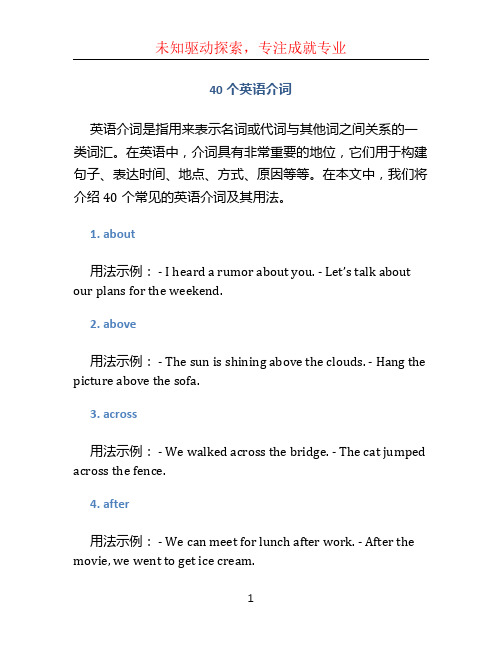
40个英语介词英语介词是指用来表示名词或代词与其他词之间关系的一类词汇。
在英语中,介词具有非常重要的地位,它们用于构建句子、表达时间、地点、方式、原因等等。
在本文中,我们将介绍40个常见的英语介词及其用法。
1. about用法示例: - I heard a rumor about you. - Let’s talk about our plans for the weekend.2. above用法示例: - The sun is shining above the clouds. - Hang the picture above the sofa.3. across用法示例: - We walked across the bridge. - The cat jumped across the fence.4. after用法示例: - We can meet for lunch after work. - After the movie, we went to get ice cream.5. against用法示例: - He leaned against the wall. - The cat rubbed against my leg.6. along用法示例: - We walked along the beach. - Drive along the highway until you see the sign.7. among用法示例: - There is a sense of camaraderie among the team members. - The book is hidden among the other books on the shelf.8. around用法示例: - The children ran around the playground. - We walked around the park.9. as用法示例: - She worked as a teacher for many years. - You can use this hammer as a tool.10. at用法示例: - I met him at the café. - The meeting is scheduled at noon.11. before用法示例: - Let’s finish this task before the deadline. - He left the house before sunrise.12. behind用法示例: - The car is parked behind the building. - He hid behind the tree.13. below用法示例: - The temperature is below freezing. - The answer is written below the question.14. beneath用法示例: - The treasure is buried beneath the sand. - He found a note hidden beneath the pillow.15. beside用法示例: - She sat beside her friend. - Put the book beside the vase.16. between用法示例: - I couldn’t decide between the re d or blue dress. - The lake is located between the mountains.17. beyond用法示例: - His achievements go beyond his qualifications. - The house is just beyond the hills.18. by用法示例: - The package was delivered by the mailman. - I traveled to London by plane.19. despite用法示例: - He continued working despite the fatigue. - Despite the rain, we went for a walk.20. down用法示例: - We walked down the stairs. - The book fell down from the shelf.21. during用法示例: - We went on vacation during the summer. - I read a book during the flight.22. except用法示例: - Everyone was present except for John. - We ate all the cake except for one slice.23. for用法示例: - This gift is for you. - He studied for hours.24. from用法示例: - He received a letter from his friend. - She ran away from the crowd.25. in用法示例: - The book is in the bag. - She lives in Paris.26. inside用法示例: - He is waiting inside the building. - The keys are inside my pocket.27. into用法示例: - He jumped into the pool. - Pour the milk into a glass.28. like用法示例: - I feel like going for a walk. - He looks like his father.29. near用法示例: - There is a coffee shop near the office. - The playground is near the school.30. of用法示例: - She is the mother of two children. - The top of the mountain was covered in snow.31. off用法示例: - He took the hat off his head. - The plane took off from the runway.32. on用法示例: - The book is on the table. - I put on my coat.33. out用法示例: - He stepped out of the house. - She blew out the candles.用法示例: - The cat is sitting outside the window. - He is waiting outside the door.35. over用法示例: - We talked over dinner. - The ball jumped over the fence.36. past用法示例: - She walked past the store. - We drove past the old church.37. round用法示例: - We sat around the table. - The bus goes round the city.38. through用法示例: - He read through the book. - They walked through the forest.39. to用法示例: - He gave the present to his sister. - We went to the park.用法示例: - The cat is sleeping under the table. - The book is under the bed.以上是40个常用的英语介词及其用法。
英语介词的用法归纳
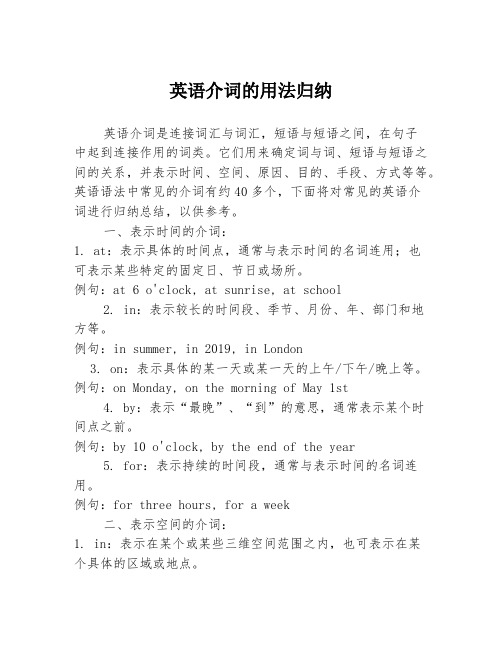
英语介词的用法归纳英语介词是连接词汇与词汇,短语与短语之间,在句子中起到连接作用的词类。
它们用来确定词与词、短语与短语之间的关系,并表示时间、空间、原因、目的、手段、方式等等。
英语语法中常见的介词有约40多个,下面将对常见的英语介词进行归纳总结,以供参考。
一、表示时间的介词:1. at:表示具体的时间点,通常与表示时间的名词连用;也可表示某些特定的固定日、节日或场所。
例句:at 6 o'clock, at sunrise, at school2. in:表示较长的时间段、季节、月份、年、部门和地方等。
例句:in summer, in 2019, in London3. on:表示具体的某一天或某一天的上午/下午/晚上等。
例句:on Monday, on the morning of May 1st4. by:表示“最晚”、“到”的意思,通常表示某个时间点之前。
例句:by 10 o'clock, by the end of the year5. for:表示持续的时间段,通常与表示时间的名词连用。
例句:for three hours, for a week二、表示空间的介词:1. in:表示在某个或某些三维空间范围之内,也可表示在某个具体的区域或地点。
例句:in the room, in the park2. on:表示在某个平面面上,通常用来表示地点。
例句:on the table, on the wall3. at:表示在某个具体的地点或位置。
例句:at the door, at the bus stop4. by:表示“靠近”、“经过”等含义。
例句:by the river, by the window5. between:表示在两个或两个以上的物体或位置之间。
例句:between two mountains, between the buildings6. among:表示在三个或三个以上的物体或位置之间。
介词的用法总结

介词的用法1.表示地点位置的介词1)at ,in, on, to,forat (1)表示在小地方; (2)表示“在……附近,旁边”in (1)表示在大地方; (2)表示“在…范围之内”。
on 表示毗邻,接壤,“在……上面”。
to 表示在……范围外,不强调是否接壤;或“到……”2)above, over, on 在……上above 指在……上方,不强调是否垂直,及 below相对;over指垂直的上方,及under相对,但over及物体有一定的空间,不直接接触。
on表示某物体上面并及之接触。
The bird is flying above my head. There is a bridge over the river. He put his watch on the desk.3)below, under 在……下面under表示在…正下方below表示在……下,不一定在正下方There is a cat under the table.Please write your name below the line.4)in front [frant]of, in the front of在……前面in front of…意思是“在……前面”,指甲物在乙物之前,两者互不包括;其反义词是behind(在……的后面)。
There are some flowers in front of the house.(房子前面有些花卉。
) in the front of 意思是“在…..的前部”,即甲物在乙物的内部.反义词是at the back of…(在……范围内的后部)。
There is a blackboard in the front of our classroom.我们的教室前边有一块黑板。
Our teacher stands in the front of the classroom.我们的老师站在教室前.(老师在教室里)5)beside,behindbeside 表示在……旁边behind 表示在……后面2.表示时间的介词1)in , on,at 在……时in表示较长时间,如世纪、朝代、时代、年、季节、月及一般(非特指)的早、中、晚等。
- 1、下载文档前请自行甄别文档内容的完整性,平台不提供额外的编辑、内容补充、找答案等附加服务。
- 2、"仅部分预览"的文档,不可在线预览部分如存在完整性等问题,可反馈申请退款(可完整预览的文档不适用该条件!)。
- 3、如文档侵犯您的权益,请联系客服反馈,我们会尽快为您处理(人工客服工作时间:9:00-18:30)。
40个英语介词用法总结
1. At: 表示时间、位置或状态,例如at 3 o"clock, at the park, at peace.
2. In: 表示时间、位置或状态,例如in May, in the room, in trouble.
3. On: 表示日期、时间、表面或状态,例如on Monday, on the table, on fire.
4. By: 表示手段、方法或时间,例如by train, by email, by noon.
5. For: 表示目的、受益者或时间期限,例如for fun, for him, for two weeks.
6. To: 表示方向、目的地或比较,例如to school, to London, to me.
7. From: 表示起点、来源或分离,例如from home, from China, from each other.
8. Into: 表示进入、转化或改变,例如into the house,
into a pumpkin, into a butterfly.
9. Out of: 表示脱离、从中取出或缺乏,例如out of the room, out of money, out of the blue.
10. With: 表示伴随、附带或具备,例如with friends, with
a smile, with experience.
11. Without: 表示没有、不带或缺少,例如without
permission, without shoes, without doubt.
12. Over: 表示覆盖、超过或结束,例如over the roof, over the limit, over and done with.
13. Under: 表示在下面、被支配或不足,例如under the table, under his control, under budget.
14. About: 表示关于、大约或忙于,例如about the movie, about 10 dollars, about to leave.
15. Above: 表示在上面、高于或超过,例如above the clouds, above average, above suspicion.
16. Below: 表示在下面、低于或不足,例如below the surface, below freezing, below par.
17. Across: 表示横穿、相交或涉及,例如across the street, across the board, across his mind.
18. Beyond: 表示超出、远离或除了,例如beyond repair, beyond belief, beyond her control.
19. Around: 表示周围、附近或环绕,例如around the corner, around the clock, around the world.
20. Before: 表示以前、在前面或比较,例如before noon, before the house, before his time.
21. Behind: 表示在后面、落后或背后,例如behind the house, behind schedule, behind the scenes.
22. Beside: 表示在旁边、与...相比或附加,例如beside
the river, beside myself, beside the point.
23. Inside: 表示内部、在里面或被包含,例如inside the box, inside the building, inside information.
24. Outside: 表示外部、在外面或超出,例如outside the house, outside the box, outside the norm.
25. Through: 表示穿过、经过或完成,例如through the door, through the park, through with it.
26. Throughout: 表示遍布、贯穿或在整个期间,例如throughout the city, throughout history, throughout the day.
27. Towards: 表示朝向、对于或接近,例如towards the sun, towards him, towards the end.
28. Against: 表示反对、抵抗或紧挨着,例如against the law, against the current, against the wall.
29. Among: 表示在...之中、相互之间或被分配到,例如among friends, among the stars, among the winners.
30. Between: 表示在两者之间、在中间或相互之间,例如between two trees, between classes, between you and me.
31. Within: 表示在内部、在范围之内或在规定时间内,例如within the house, within the budget, within a week.
32. Without: 表示在外面、没有或不用,例如without the room, without a doubt, without further ado.
33. Beneath: 表示在下面、低于或不足,例如beneath the surface, beneath his dignity, beneath contempt.
34. Beside: 表示在旁边、与...相比或附加,例如beside the river, beside myself, beside the point.
35. Into: 表示进入、转化或改变,例如into the house, into a pumpkin, into a butterfly.
36. Upon: 表示在...之上、一旦发生或基于,例如upon the hill, upon arrival, upon further consideration.
37. With: 表示伴随、附带或具备,例如with friends, with
a smile, with experience.
38. Within: 表示在内部、在范围之内或在规定时间内,例如within the house, within the budget, within a week.
39. Without: 表示没有、不带或缺少,例如without permission, without shoes, without doubt.
40. Beneath: 表示在下面、低于或不足,例如beneath the surface, beneath his dignity, beneath contempt.。
